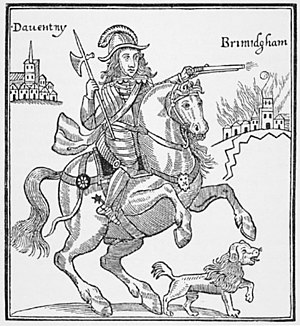Battle of Birmingham
| Battle of Camp Hill (Battle of Birmingham) | |||||||
|---|---|---|---|---|---|---|---|
| Part of the First English Civil War | |||||||
 Prince Rupert shown attacking "Brimidgham", from the Parliamentarian pamphlet A True Relation of Prince Ruperts Barbarous Cruelty against the Towne of Brumingham |
|||||||
|
|||||||
| Belligerents | |||||||
| Royalists | Parliamentarians | ||||||
| Commanders and leaders | |||||||
| Prince Rupert | Captain Richard Greaves | ||||||
| Strength | |||||||
| 600–700 foot, 1,200 horse | 300 foot and militia | ||||||
| Casualties and losses | |||||||
| ~30 | 15 men one or two women 40 prisoners more than 340 left homeless. | ||||||
The Battle of Camp Hill (or the Battle of Birmingham) took place in and around Camp Hill, during the First English Civil War, on Easter Monday, 3 April 1643, when a company of Parliamentarians from the Lichfield garrison with the support of some of the local townsmen, in all about 300 men, attempted to stop a detachment of Royalists, of about 1,200 cavalry and 200 foot men, under the command of Prince Rupert from passing through the unfortified parliamentary town of Birmingham.
The Parliamentarians put up a surprisingly stout resistance, and according to the Royalists shot at them from houses as they drove the small Parliamentary force from the town and back towards Lichfield from whence they came. To suppress the musket fire, the Royalists torched the houses from which the shooting was thought to come. After the battle the Royalists spent the rest of the day in the town during which time they pillaged it. The next morning after the main body of the Royalist force had left town, many more houses were put to the torch. While pillaging and firing an unfortified town in retaliation for resistance was common at that time on Continental Europe it was not usual in England and this handed the Parliamentary side a propaganda weapon which they used to disparage the Royalists.
At the start of the Civil War the area that would become known as the Black Country in North-West Worcestershire and Birmingham was one of the few places in England that could produce the various military stores of which King Charles I was in dire need. As he had failed to secure the arsenals of Portsmouth and Hull, he did not possess any supply of swords, pikes, guns, shot; all these Worcestershire could and did provide. Shot came from Stourbridge and from Dudley cannon. The numerous small forges which then existed on every brook in the north of the County turned out successive supplies of sword blades and pike heads. It is said that among the many causes of anger Charles had against Birmingham was that one of the best sword makers of the day, a man named Robert Porter, who lived and made his blades in Worcestershire, but sold them in Birmingham, refused at any price to supply swords for "that man of blood", or any of his adherents.
...
Wikipedia
